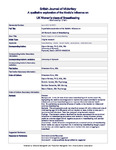A qualitative exploration of the Media’s Influence on UK Women’s views of Breastfeeding
| dc.contributor.author | Srivastava, K | |
| dc.contributor.author | Norman, Alyson | |
| dc.contributor.author | Mortimer, S | |
| dc.date.accessioned | 2021-11-16T16:31:10Z | |
| dc.date.issued | 2022-01-02 | |
| dc.identifier.issn | 0969-4900 | |
| dc.identifier.issn | 2052-4307 | |
| dc.identifier.uri | http://hdl.handle.net/10026.1/18373 | |
| dc.description.abstract |
<jats:sec><jats:title>Background</jats:title><jats:p> In the UK, rates of exclusive breastfeeding at 6 months are at 1%, highlighting the need to encourage and improve the support provided to women to initiate and continue breastfeeding and to improve infant and maternal health. This study aimed to qualitatively explore the influence of media on the intention to initiate and continue breastfeeding. </jats:p></jats:sec><jats:sec><jats:title>Methods</jats:title><jats:p> This ethnographic study recruited 40 women; 31 with children and nine of childbearing age (19–28 years), with the intention to have children. Data were collected with semi-structured interviews and analysed using thematic analysis. </jats:p></jats:sec><jats:sec><jats:title>Results</jats:title><jats:p> Five themes associated with sociocultural influences on breastfeeding perceptions and behaviour were identified: family influence, privacy, media as a double-edged sword, negative exposure to breastfeeding and planned behaviour versus experience. </jats:p></jats:sec><jats:sec><jats:title>Conclusions</jats:title><jats:p> Media influences strengthened preconceived notions of breastfeeding. Social media can play an important role in maintaining breastfeeding though support but can also put undue negative pressure on mothers who struggle to breastfeed. </jats:p></jats:sec> | |
| dc.format.extent | 10-18 | |
| dc.language | en | |
| dc.language.iso | en | |
| dc.publisher | Mark Allen Healthcare | |
| dc.subject | Pediatric | |
| dc.subject | 3.1 Primary prevention interventions to modify behaviours or promote wellbeing | |
| dc.subject | Reproductive health and childbirth | |
| dc.title | A qualitative exploration of the Media’s Influence on UK Women’s views of Breastfeeding | |
| dc.type | journal-article | |
| plymouth.issue | 1 | |
| plymouth.volume | 30 | |
| plymouth.publication-status | Published | |
| plymouth.journal | British Journal of Midwifery | |
| dc.identifier.doi | 10.12968/bjom.2022.30.1.10 | |
| plymouth.organisational-group | /Plymouth | |
| plymouth.organisational-group | /Plymouth/Faculty of Health | |
| plymouth.organisational-group | /Plymouth/Faculty of Health/School of Psychology | |
| plymouth.organisational-group | /Plymouth/REF 2021 Researchers by UoA | |
| plymouth.organisational-group | /Plymouth/REF 2021 Researchers by UoA/UoA04 Psychology, Psychiatry and Neuroscience | |
| plymouth.organisational-group | /Plymouth/Research Groups | |
| plymouth.organisational-group | /Plymouth/Research Groups/Centre for Brain, Cognition and Behaviour (CBCB) | |
| plymouth.organisational-group | /Plymouth/Research Groups/Centre for Brain, Cognition and Behaviour (CBCB)/Behaviour | |
| plymouth.organisational-group | /Plymouth/Users by role | |
| plymouth.organisational-group | /Plymouth/Users by role/Academics | |
| dcterms.dateAccepted | 2021-11-15 | |
| dc.rights.embargodate | 2022-6-28 | |
| dc.identifier.eissn | 2052-4307 | |
| dc.rights.embargoperiod | Not known | |
| rioxxterms.versionofrecord | 10.12968/bjom.2022.30.1.10 | |
| rioxxterms.licenseref.uri | http://www.rioxx.net/licenses/all-rights-reserved | |
| rioxxterms.licenseref.startdate | 2022-01-02 | |
| rioxxterms.type | Journal Article/Review |


